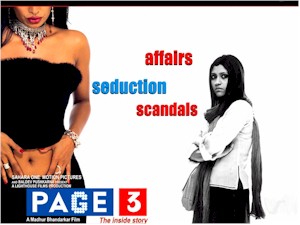Shallow two-faced celebrities, humans who are dead inside, sniggering voyeurs, betrayal, shady politics and prejudice and on and on and on... Madhur Bhandarkar´s "Page 3" is a movie on the world of showbiz and it captures the many aspects of human life.

Like much of Altman cinema, "Page 3" has no main plot but looks through many stories of many characters. Bhandarkar attempts to tie things together by looking at incidents through the focus of naive journalist, Madhavi (Konkona Sen Sharma) but even then, as viewers, we are shown things happening that even Madhavi herself would not be aware of.
Here, she sees the grim side of life and from this step into reality; the world of showbiz starts to look even more ugly. The suicide of a respected socialite makes Madhavi question the purpose of her life. Madhavi´s aim to get the truth out into the public has her clashing with her editor, Deepak (Boman Irani). The grim ending shows Madhavi being sucked back into the world of showbiz once again and meeting many familiar faces who have changed, either for the better or for the worse. As she leaves, the party behind her carries on pumping up the volume showing that this glittery world that is trapped in its own fantasy will carry on forever, come what may.
My views on the article & film : This Film is not like any other Bollywood film it reflects the people in society we live in today. The niave journalist reflects the society as being niave aswell as unaware of the truth. People in India have a conservative stance on homosexuality, divorce, immoral behaviour etc... therefore they refuse to be introduced to this idea, however this film shows the modern society.
What made me chose a Bollywood Film? well, its something i feel strongly about! People especially at this age tend to think bollywood is 'uNcOoL'!! These NARROW MINDED people think that Bollywood is all about "boy meeting girl.." blah blah blah! talk about sTeReOtYpiNg or what!!! grr ..anyway... back to my independent study....
After watching this film i had realised that topics and issues that were debated were parrallel social issues brought up today. These issues were not used as "eScApiSm" as most would argue bollywood was all about, but infact used to inform people of real life facts. My independent study will be based on analysing the realism portrayed in this film to argue that Bollywood is not all about escapism. Other texts that i will be reffering to are; Black, Rang de Basanti (many more which i need to look into )
MeDiA LaNgUaGeS aNd FoRm : Before even watching the film there are two perceptions of this film. To the British audience would see "Page 3" as a parallel to 'The sun' although to the Indian audience 'Page 3' is a simple reminder of the celebrity column in a magazine. This pun infact they both have some sort of relevance in the film. 'Page 3' in the British term is a symbol of women being presented as sex symbols identically presented in this Bollywood film. For the Indian audience of celebrity gossip is always shown as this film evolves around the higher class, glamerous celebrities. The repetitive image shown in this film is this idea of celebration and party, this can relate to the lifestyle that the celebrities hold. The camera also has a important significance as this film is about a journalist capturing the "life" of celebrities, a false image which is achieved due to the power and control celebrities have over the media. Close- ups used allows the audience to identify with the characters to make our own judgements on which is right or wrong or infact the 'Hero' or the 'Villian'. Regardless, this film uses english dialect posibably to attract the western audience however to show that India itself are not known to just their language. 
InStiTuTiOn: Lighthouse Entertainment / Sahara One Pictures
GeNrE: Bollywood Film (social drama). Introduces a new set of actors who have not been associated with any other film, therefore the audience do not know what to expect. The name itself "Page 3" might of been instantly seen as a positive thing to Indian people, as this column in the Indian magazines are the celebrity gossip, after watching the film people will begin to realise aspects of celebrity life that were not available to them, now making them more aware to these situations.
RePrEseNtaTiOn:Unlike most bollywood films Page 3 challenges the 'escapism' and promotes this idea of realism which in continuously shown. Page 3 talks about issues that are based around the elite, celebrities, goverment and the police.
Women: Troughout the film, they also show the disadvantages of being women, however they dont show women to be obediant housewives a traditional view they acually show women who try and make it into the show business however the lengths they have to go through to get there adds to the realism.
Indian Law and Police : corruption in india, everyone is driven by money. Celebrities have people in high places which adds to their advantage of running things the way they want to.
Celebrities : Who use their money and power to get what they want to and work around the system. Page 3 shows the celebrities to have more power and authority than the police in India.
Modern factors : drugs, homosexual behaviour, infidelity etc... all these are attracting the western audience, but we tend to exclude the piont that all these things happen in India.
AuDiEnCe: Addressed to both Indian and British people. The assumptions made of the audience related to the text is that they must be willing to see Bollywood as a neagtive factor, ruling out all the stereotypes made. The fact that the Indian audience were not impressed with this film was due to the fact it showed real life events which they want to get away from. However Page teaches them about social issues that was encounter today. However this film was liked by the British audience as it showed something different rather than the typical storyline 'boy meets girl'. This film is made to make the audience be more aware and open to realism.
IdEoLoGy : People who have money and authority use it to bribe the goverment and police, a view which is encouraged by Marxism.
NaRrAtiVe: Page 3 follows the life of different characters all alowing us to see the broader picture. The main protagonist, Madhavi (Konkona Sen Sharma) a studying journalist presents us with negative sides of celebrities that Bollywood tends to ignore. The main character has a link to all the other side charcters, she acts as a catalyst and makes the narrative move forward and discover the real life. This film shows everyone out to be a villan of some sort, all of which have got away with due to themoney and status they have. The image which is always repeated is the symbol of celebration. This dictates their life as glamerous and rich. Although we see them as powerful people, the protagonist makes us realise that they have no interest in the social issues such as the terrorist attacks and the death of a friend still going on with the party as well the the audience, Madhavi realizes how celebrities are all interesting in their own lifes. 
SoCiaL:Talks about issues brought up today, terrorism, homosexuals, celebrities etc..which is uncommon in the indian community therefore this reflects a realist view.
HisToRicAl:These stereotypes that we place on Bollywood conventions are being discouraged in 'Page 3' It challenges conventions not all bollywood films are love stories!!!
EcOnOmiCaL:Goverment play a part in funding, so do banks and huge businesses, This is very common in Bollywood.Compared to earlier years, Asians have more disposable income (‘the Brown Pound’) which means that more entertainment is being made for/by them.
As Asian culture has become more popular in today, producers have more confidence and are more likely to investing in Asian related entertainment. This may be seen as exploitation of the Asian culture by money hungry white people.
PoLiTiCaL:Corruption, This idea that things are poltically corrupt. we are open to the people in power and the abuse. Which make us think REALISTICALLY about India's police and government. In the 1970’s certain political groups were fighting against immigration and Asians had not-so-good career prospects as they were given no opportunities. In comparison, today Asians have been accepted and the Labour Party are even “seeking to increase the participation and achievement of ethnic minorities at all levels of the labour market.” This shows that these days Asians have established themselves as proper British citizens and therefore the have more power in society than ever before.
The poster of Page 3 >

